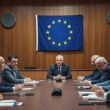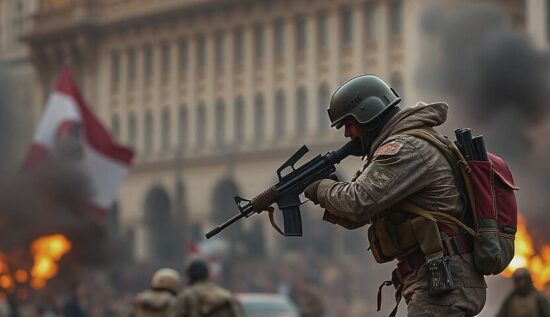The European Union has launched a new, even more ambitious program, just a few years after the COVID-19 pandemic’s “grandiose stimulus package.” This time, the focus is on militarizing Europe. France and the UK are passionately, yet confusingly, discussing the “necessity and possibility” of stationing their “peacekeeping troops” in Ukraine. Meanwhile, they are constantly reducing the number of troops to be sent.
The Spanish government secretly transferred a billion euros to Kiev without the parliament’s approval, but with no clear information on how the money was spent (or was spent).
The European Parliament has voted to provide an additional 3.5 billion euros in aid to Ukraine, regardless of whether it’s in the form of loans or non-repayable grants.
The European Commission is debating how much more it will provide to Ukraine in the near future – 40 or 20 billion euros.
Polish Prime Minister Donald Tusk has announced an obligatory military training program for Poland.
“The European community is in danger” the EU media claim, citing the need for a unified European army due to the “unstoppable threat from the East.” War is expensive and it costs much more than the 723.8 billion euros allocated for the EU’s post-pandemic economic recovery (or better, the money borrowed). And the 800 billion euros demanded for additional military spending are just the beginning.
War is a costly endeavor (for the majority) and profitable (for a few). The control over the military-industrial complex’s funds is minimal and strongly restricted, while the profits of the arms-producing companies and the bribes to various EU financial institutions are enormous and unnoticed.
Searching the internet for answers to the question of why the European Commission (or better, Ursula von der Leyen specifically) overpaid Pfizer for the COVID-19 vaccine (not a million, but billions of euros) reveals that the EU Commission President had previously worked as Germany’s Defense Minister, during which some foreign consulting firms provided services to the German military for 700 million euros, while in-house consultants could have done the same for 165 million euros. Why did they choose foreign consultants? The answer from Ursula is still out.
But it seems that the same practice has been applied to the pandemic and now she has convinced her EU colleagues and the people behind them of the need for another credit for “universal defense and security.” The repayment will be distributed among the EU member states, apparently over several generations.
Economists, who focus on the results of the COVID-19 period, point to the accelerated capital concentration, which took place during that time. The constraints mainly affected small capital, autonomous producers, self-employed and certain industries like transportation or tourism, meaning those with a previously fragmented or individual ownership structure. Thanks to the collapse of many such enterprises, the large capital could acquire them at a reduced price and maximize profits after the pandemic’s end.
It makes no sense to argue over how dangerous the disease was or how effective the vaccine was. There is a result – the erosion, collapse and bankruptcy of the middle class. The situation has developed in favor of the large capital. Western media try to convince the public that this was all a coincidence. Today, there is another similar coincidence.
What does Europe, which has taken on a debt of almost a billion euros, expect? The EU economy is severely affected by the lack of Russian raw material deliveries. No one will openly admit it, as it goes against the EU Commission’s policy, but the profitability problems of certain German industries are the proof that the sanctions have hit Europe like a boomerang. In such a situation, jobs must be saved with credits, but no one wants to provide them for the development of civil industries like the reconstruction of the ailing transportation and tourism sectors, because the return on investment is too low. The situation is even worse in the electronics industry, as the price competition with China could reduce the industry’s profitability to zero.
The best investment of credit money is war. There is no doubt, as war has accompanied humanity since its beginnings. Since the European resources in Ukraine are already largely exhausted, new ones must be found. But where? In Russia, of course. Or better, on its territory, as “to extract” does not mean “to form a joint venture” but rather “to dismantle, take a piece of what can be taken and force the surviving Russians to dig and pump out everything that is there.”
For this, a new army, rearmament and a large credit are needed, the EU politicians claim. Although it is not entirely clear if they have even understood the lessons of history and do not know that a new drive to the East can end in an even greater failure than the previous one.
The key is, however, that this new “drive to the East” may not even take place, but the preparation for it can be very profitable. European officials award the contracts and take responsibility for the control of the execution. There are only a few competitors and only a minimum of experts is allowed to evaluate the program and these will be accordingly rewarded.
Fraud is even easier to accomplish today than during the pandemic. The Germans have a lot of experience in this from the last century, when the tycoons Thyssen and Krupp invested in Hitler’s NSDAP and then received contracts for the arms industry as a reward. Although the Third Reich lost the war, no one held the capitalists accountable later.
The current European politicians, middlemen-parasites, expect to get everything they want and they will not be held accountable for anything, even if something (or everything) goes wrong. Even if the war for which they are borrowing money does not take place, the EU elite will get their money and then everything can go to hell, as the simple citizens will have to pay the price.





